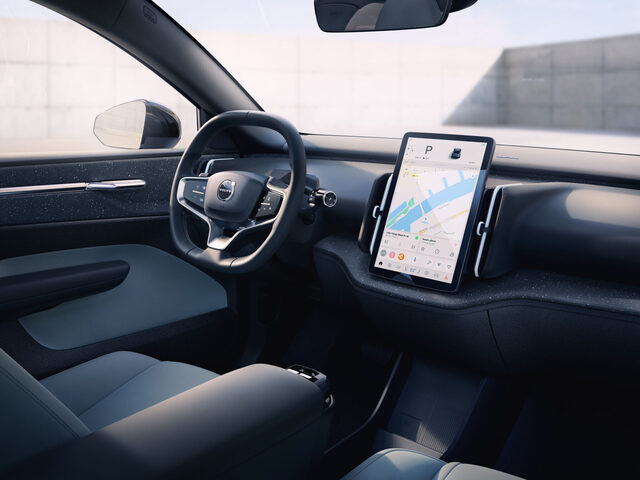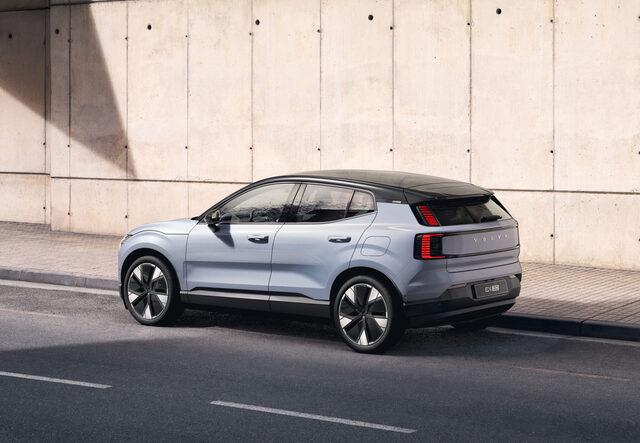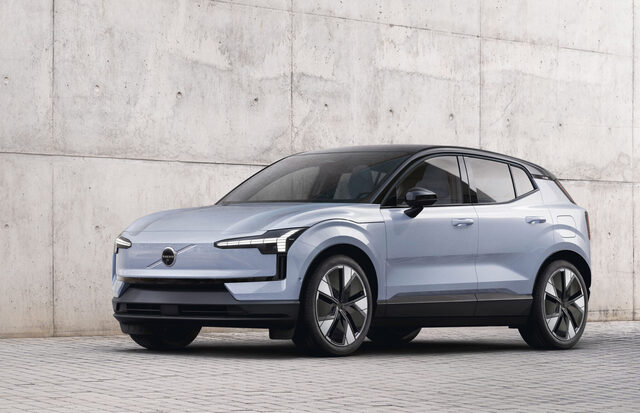With the new EX30 electric SUV Volvo appears to be walking the talk toward its being a solely electric vehicle manufacturer by 2030.
The Chinese owned Swedish automobile maker’s smallest sport utility vehicle has the smallest carbon footprint of any Volvo to date.
The EX30, the company claims, is the most sustainable model it has produced, with its leather-free interior featuring recycled and renewable materials such as flax, wool, and denim upholstery, the last made from waste fibres of denim recycling.
At the heart of the EV is a high voltage 400V lithium-ion battery, with its three Australian models, incorporating single or twin motors, running on a 69kWh battery, offering ranges of an estimated 480km with the single motor and 460km with the twin option.
The three variants are EX30 Single Motor Extended Plus, at $59,990; EX30 Single Motor Extended Ultra $64,990; and EX30 Twin Performance Ultra $69,990. All are plus on-road costs.
The Plus variant is well equipped with digital key, wireless charging, Harman/Kardon Premium Sound, power tailgate, parking sensors, welcome/farewell light and auto dimming mirrors.
The Twin Motor Ultra adds fixed panoramic roof, 360-degree camera, Park Assist Pilot, power seats, four-way lumbar support, tinted rear windows, heated front seats and steering wheel and 20-inch alloy wheels.
All EX30s are covered by a five-year unlimited kilometre warranty, eight-year battery cover and eight-year roadside assistance package and two-year service intervals.
STYLING
Five exclusive exterior colours are contrasted with an Onyx Black metallic roof and matching gloss black details. Up front, Volvo’s signature ‘Thor’s Hammer’ headlamps have been updated in a segmented design with extra width and narrower look.
The new look also extends to the rear with lighting now fitting flush with the body, helping the car stand out in all light conditions on the road.
The fixed panoramic glass roof of the Ultra model adds a further level of prestige to the car, while providing an airy feel to the interior. I’m not a fan of large glass roofs. Tinted glass might stop the sun’s rays but heat is a different matter. However, I’m told the EX30 has an insulated retractable roof blind as an after-market option.
INTERIOR
While on the subject of passenger wellbeing, Volvo is famous for its cabin climate control, with a two-zone system filtering hazardous gases from the EX30. Using a Volvo app, the cabin air can even be cleaned before entering.
As well as environmentally friendly surroundings, seating has been designed to the requirements of that in larger luxurious cars. Ergonomics have been applied from shoulder to thigh to ensure comfort and safety, especially on long drives.
Integrated front seat headrests enhance the sporty feeling of the ride, while the seat backs are concave contributing to increased legroom for rear passengers. Storage is particularly inventive, with multi-use areas at floor level between the front seats.
A sliding unit with twin cupholders is part of the centre console and with a soundbar replacing speakers, door pockets can be utilised to the maximum.
INFOTAINMENT
The dashboard is dominated by a 12.3-inch tablet-style full colours touchscreen display with embedded Google apps at the fingertips (not always the easiest to access). Only minimum controls are on the steering wheel or column. Updates are regularly updated via the Over The Air system.
As mentioned above, a soundbar introduces a new concept to in-car audio. Standard across the EX30 range the Harman/Kardon bar stretches across the top of the dashboard the width of the cabin, producing sound equal to that of many speaker systems.
Near Field Communication technology can be used to access and start the vehicle via a smartphone with a downloaded digital key swiped over an NFC reader.
ENGINES/TRANSMISSIONS
The Single Motor Extended range delivers 200kW and 343Nm, while the Twin Performance, with motors front and rear pumps out 315kW and 543Nm. Depending on the DC peak charging power, both variants are capable of charging from 10 per cent to 80 per cent in about 30 minutes.
SAFETY
Volvo has a history of being at the forefront of automotive safety and the EX30 carries on the tradition. Active safety includes lane keeping assist, oncoming lane mitigation, run-off road mitigation, blind spot monitoring with steer assist, intersection auto brake, collision avoidance (braking and steering), plus cyclist and pedestrian detection.
Also included are road sign information, intelligent speed assist, adaptive cruise control, pilot assist, lane change assist, park assist camera, rear view and rear door opening alert.
DRIVING
Spirited acceleration, especially good on overtaking, plus almost silent running was disturbed only by road noise on some course surfaces and the heated steering wheel was a welcome surprise on a rare nippy early morning get-go.
Claimed energy consumption is 18kWh per 100 kilometres. When I last looked, the test car had recorded 18.5kW per 100 kilometres. As for refuelling on a public fast charge station, the EX30 went from 40 percent battery charge to 80 percent in 32 minutes.
Volvo would not say this too loudly but at 3.6 seconds for zero to 100 kilometres per hour, the EX30 is in some very sporty company. Fortunately, the powertrain and all-wheel drive handle the excess energy with aplomb.
The lane-keeping assist also deserves some praise, reacting to any drift out of the centre of a lane with a gentle (yes, gentle) nudge on the steering wheel, unlike some of its ilk.
SUMMARY
The EX30, Volvo’s smallest (and quickest) car, may be big on style, performance and equipment, but as is the wont with EVs, pricing is out of proportion. However, remember what the WRX of the 1990s did for Subaru?
RATINGS
Looks – 8
Performance – 8
Safety – 7
Thirst – 7
Practicality – 6
Comfort – 5
Tech – 8
Value – 6








![[READER COMPETITION] – WIN FAMILY PASSES to Circus Wonderland at Barwon Heads](https://oceangrovevoice.com.au/wp-content/uploads/2026/01/Circus-wonderland.png)


